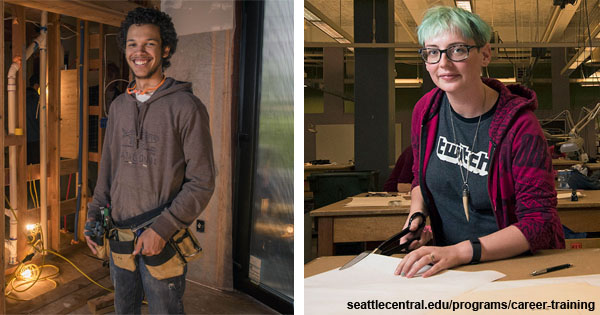OPINION
How community action saved Seattle Central training programs
Legislature needs to prioritize CTC funding to end such self-destructive proposals
By CORTNEY MARABETTA
(May 6, 2022) — Last Wednesday, The Seattle Times reported that the Culinary Arts program at Seattle Central College was scheduled for closure, due to budget concerns at the school. It went unreported, but the Maritime Academy, Wood Technology Center, and Apparel Design programs were also slated to close. Losing those programs would not only be a blow to the students, but also to the regional employers who rely on graduates from those programs.
But this week, the Seattle Central College administration backed down amid a groundswell of support for the programs and agreed to maintain them — for now. Here’s how it played out and what Washington state needs to do to avoid similar self-destructive budget cuts in the future.
The Maritime Academy is Coast Guard-certified and a pathway to working on the Washington State Ferry system, the largest ferry system in the country. The restaurant industry is still trying to recover from COVID-19 and is notably starved of trained workers at all levels, a need the Culinary Arts program is positioned to fill. One may not think of Seattle or Washington as epicenters of the fashion industry, but the Apparel Design & Development program knows better – its petition included its graduate employment numbers for recent years; the only recent year that didn’t have a 96% or 100% employment rate was the year that graduated a number of independent designers. The Wood Technology center graduates skilled woodworkers who find employment all across the state.
Closing these programs, which transform the lives of their students by opening pathways to higher education, would cost employers and communities. All four programs provide workforce training and graduate students who have in-demand skills and access to a secure future.
So when word leaked out that a Seattle Central budget committee was expected to recommend their closure, petitions were started by several of the programs and by the Asian Pacific American Labor Alliance (APALA), and they struck a chord in the community. By Tuesday, thousands had already signed them in support.
 Union and community members, students, alumni and business owners came together to tell Seattle Central that their budget crisis could not be solved by slashing programs and squashing students’ dreams for the future. Culinary students and their supporters held a noisy pot-clanging march on campus.
Union and community members, students, alumni and business owners came together to tell Seattle Central that their budget crisis could not be solved by slashing programs and squashing students’ dreams for the future. Culinary students and their supporters held a noisy pot-clanging march on campus.
The protesters were singing a common and familiar refrain: investing in students, investing in faculty and staff, investing in the future, gives enormous return to the communities and to the state. Monetary return, certainly – our state’s Community and Technical Colleges generate $20.5 billion in economic activity every year – but also the benefit of the students’ skills and knowledge.
And the result of so much solidarity? Of standing up for what’s right, which is investing in people’s improved futures?
On Wednesday, the pressure from thousands of students, workers, and community members reversed the decision to close the programs. The threat to close these programs led to external funders going into problem-solving mode and the administration taking a closer look at their finances. In its own way, that’s also a familiar refrain: there’s no money for investing in the CTCs that build our workforce until and unless the community stands up and notices, which isn’t sustainable.

The inadequate funding the state gives to the CTCs leads directly to this, and we should not have to sell our educational system to private investors to give Washingtonians the education they need. It must, instead, be a priority of the Washington State Legislature to recognize that workforce education is education, and must be invested in. We can’t go from fiscal crisis to fiscal crisis, slashing programs along the way and locking students out of a more secure future. There must be a fundamental shift in priorities at the state level.
The groundswell of support was powerful testimony in recognition of these programs’ essential role in making career paths accessible and affordable for everyone in the community. Which, at the end of the day, is all the people who signed those petitions and stood in solidarity wanted: to give current and future students the opportunity to fulfill their dreams for their future.
 Cortney Marabetta is Communications Coordinator for AFT Washington.
Cortney Marabetta is Communications Coordinator for AFT Washington.






